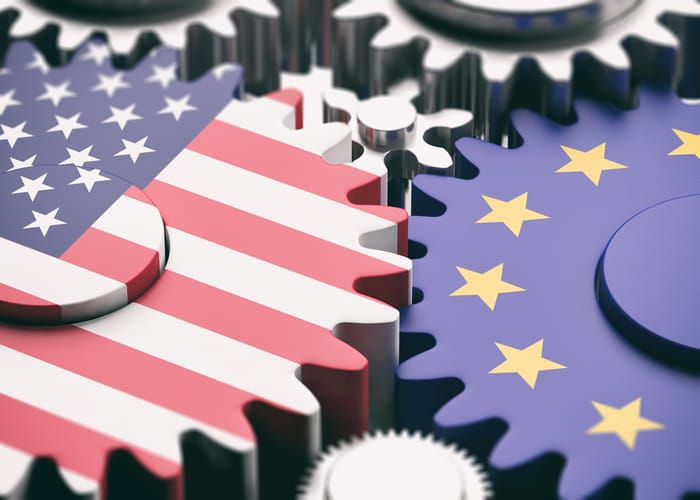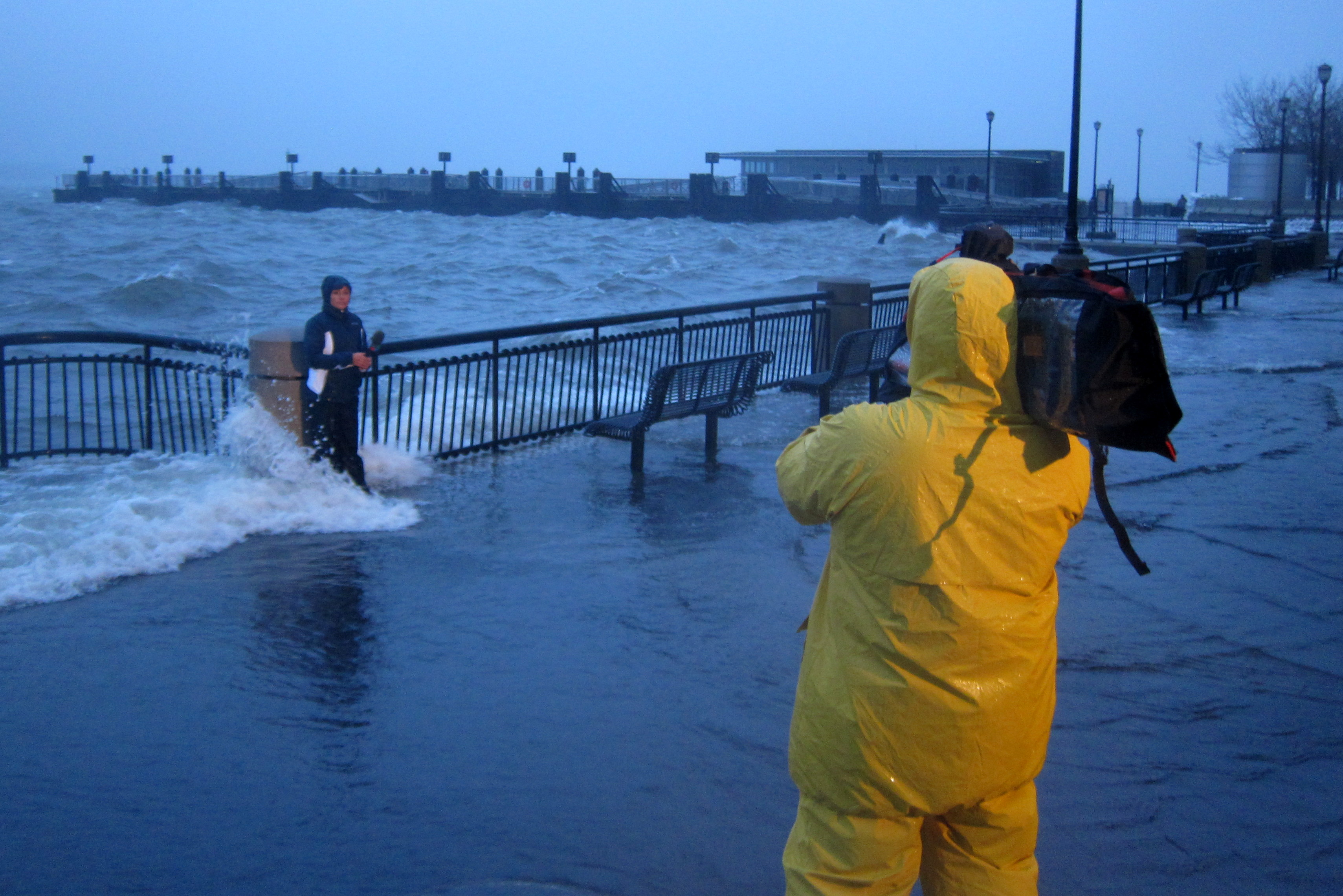 Joe Biden has replaced Donald Trump as US president, and most European media can’t hide their joy. At the same time, they are clear that the new government has some tough challenges ahead. “So much damage has been done, so much rubble has to be cleared,” writes The Guardian’s Observer.
Joe Biden has replaced Donald Trump as US president, and most European media can’t hide their joy. At the same time, they are clear that the new government has some tough challenges ahead. “So much damage has been done, so much rubble has to be cleared,” writes The Guardian’s Observer.
The Swiss Tages-Anzeiger welcomed the new president with the headline “A new day begins in America”. In the story that followed they insisted that “the principle of dignity is back” in the White House, expressing hope that Biden will “bring the country back to normality”. These sentiments were reflected in Germany’s Süddeutsche Zeitung, which declared “Joe Biden’s first and greatest mission: to lead the country back to normality after four years of Trump”.
Many media outlets emphasised Biden’s determination to change US politics. While reporting on his reversal of Trump’s orders, such as the return to WHO and the Paris Agreement on climate change, they used terms like “didn’t think twice”, “instantly” and “radical abandonment of Trump’s decisions”.
These are the highlights of the European Journalism Observatory’s (EJO) snap-shot analysis of the European media’s reaction to Biden’s arrival at the White House. Between January 15 and 21, EJO branches in Britain, Czech Republic, Georgia, Germany, Italy, Poland, Portugal, Spain, Switzerland, and Ukraine analysed three online newspapers or portals, representing a broad spectrum of political opinion, in their country.
They each examined how the media expected the Biden presidency to impact policies and trends nationally and in Europe, and their prediction of the new administration’s effects on transatlantic issues and partnerships. They also scrutinised the volume and nature of media reports on Donald Trump during this period.
Positivity and skepticism
The analysis revealed interesting trends. Almost across the board, media reflected an expectation that there will be an improvement in their country’s relationship with the US. In Poland, left-liberal Gazeta Wyborcza took it a step further, describing Trump’s departure and Biden’s presidency as a turning point, not only for the US, but also for Europe. This, they said, may hamper right-wing populism in countries such as Poland and Hungary. Expectations were also high among Georgian media outlets. They see a more rigid positioning towards Russian policies and new opportunities for Georgia to become a NATO member.
However, in the analysed Czech media, neither Trump nor Biden were presented in a predominantly positive way. Online daily Seznamzpravy.cz pointed out that Trump’s administration “will be replaced by a ‘slick’ government, which is itself not enough to unite the United States”. And while the Ukrainian pro-Western outlets examined were mostly positive towards Biden, the pro-Russian outlet Strana.ua took a different angle and was rather skeptical. In fact, it raised the issue of leaked recordings, allegedly proving Biden’s interference in Ukrainian home affairs.
In Italy, right-wing Il Giornale.it raised questions about the new administration’s ability to deal with tough challenges such as tackling extremism, branding Biden’s task “impossible”. And the Spanish conservative and pro-monarchy newspaper ABC described Trump’s policy as “coherent and predictable”, highlighting that the outgoing president “has not started any war”.
On the other hand, El Páis insisted that Trump “pulverized decades of diplomacy” and expressed great hope in Biden, though they appeared skeptical about relationships with the EU, saying: “Regardless of who is in charge of the White House, the US does not understand the transatlantic relationship as a relationship of equals.”
Many of the outlets, examined in the study, stressed that Biden will be so preoccupied with national affairs that they doubt he will have the time to focus on transatlantic relationships. As the Czech daily iDnes.cz pointed out: “The US will expect Europe to be able to solve its problems on its own, be it economic or security-related.”
In all European media Biden’s inauguration was overshadowed by the coverage of the Capitol riots, the suspension of Trump’s social media accounts, and national affairs – notably but not only the pandemic. In Portugal, for example, media coverage during the analysis period also focused on their presidential elections and the populist extreme right candidate André Ventura, leader of the “Chega” party.
Here is a more in-depth, country-by-country summary of our analysis.

Britain: Trump’s failure as president
Overwhelmingly, Biden’s inauguration has been reported as a welcomed event, with virtually every article studied in the analysis period fixating heavily on Trump’s failures as president – in terms of both domestic and foreign affairs– and the urgency with which Biden will have to act to undo Trump’s work. “So much damage has been done, so much rubble must be cleared,” an Observer editorial said.
The online publications included in the study – the Guardian, the Telegraph and the Mail – were all optimistic, to varying degrees, that the Biden administration will be an improvement on its predecessor. There was consensus across outlets that Trump was both ineffectual and dangerous, with the Capitol riot taking up a great deal of reporting and commentary bandwidth, overshadowing news on the inauguration event itself, and the work Biden plans to do and its potential impact.
This said, when reporting on foreign affairs, each outlet presented a positive appraisal of Biden as capable of addressing key problem areas, especially in terms of tackling Covid-19 as a global effort, alongside the brewing economic and climate crisis.
In a comment piece in the Guardian, former Prime Minister Gordon Brown writes that Biden, the “great conciliator” must work closely with other countries in an “alliances first” rather than an “America first” approach in the efforts to eliminate the coronavirus, rebuild commerce and trade, and deal with the climate change crisis. He stressed the need for world leaders to coordinate their fiscal stimuli to deliver growth. Brown also spoke about the importance of prioritising Iran de-escalation and standing up to “Chinese illiberalism and Russian opportunism”.
In the Telegraph, the message was similar. “From Hong Kong to Hungary, we are living through a period of astonishing democratic decline…. As the world battles the pandemic and confronts multiple attacks on democracy, it’s time to craft another ambitious plan for reconstruction and renewal,” writes Sajid Javid. The conservative politician and former home secretary suggested that the “UK’s potent blend of hard and soft power will continue to be invaluable both to the US and Europe on other shared challenges.”
Despite the apparent general consensus in the UK media that Biden is a superior ally to the country, The Mail Online raised concerns about a decline in the two nations’ ‘special relationship’. They cited reports that Biden had replaced the Oval Office’s Winston Churchill bust with that of civil rights activists. A separate article also expressed concern that Biden’s first phone call with a national leader would be with Canada’s Justin Trudeau, not Boris Johnson – perceived as a demotion for Britain.
Czech Republic: cautious skepticism
In the Czech Republic public broadcaster iRozhlas, mainstream pro-government online daily iDnes, and Seznamzpravy – the daily with the largest audience – dedicated a considerable amount of attention to the inauguration itself. Coverage was especially focused on its preparation and unprecedented security measures following the Capitol riots. One of iRozhlas’ headlines read, “Before Biden’s inauguration, the streets of Washington DC resemble Kabul”.
Both Biden and Trump dominated the coverage, and neither were presented in a dominantly positive way. An article in Seznamzpravy pointed out that “Trump’s reality show in the White House will be replaced by a ‘slick’ government, which in itself is not enough to unite the United States”.
Czech media described Joe Biden as the president who set himself the task of uniting a country in a deep social crisis with racial problems and in the grip of a pandemic that might dramatically worsen its economy. However, it was also pointed out on several occasions that Biden’s presidency will be defined by populism, as he prioritises voters’ expectations and their longing for change.
But the image of Trump was comparatively more negative. Czech media highlighted the former president’s absence at Biden’s inauguration, presenting him as sore loser whose historical status will be negatively affected by his rudeness and questionable decisions.
Biden’s stance on international relations was not a prominent feature in the Czech media. Only a few articles covered the bilateral relationships between the US and other states, and multilateral partnerships, such as the Czech Republic, EU, and NATO. The few articles that dealt with these topics expressed optimism in the prospect of improved relationships between the US and the EU with the arrival of a new president.
At the same time, the Czech media stressed that the new president will be preoccupied with national issues. As iDnes pointed out, “the US will expect Europe to be able to solve its problems on its own, be it economic or security-related.”
More generally, the Czech media predicted that Biden will, as he eventually did, cancel or soften some of Donald Trump’s executive orders such as those relating to the Paris Climate Agreement and immigration.
Georgia: high hopes for Biden’s foreign policy
The change of government in the United States has been a prominent feature in Georgian online media. Special emphasis was placed on President Biden’s perspective of Georgia, and on his rather rigid stance on Russia.
Media reports conveyed high hopes about the impact of Biden’s presidency on policy, on Georgia’s NATO membership; and, generally, on the US’ position on Russian policy relating to neighborhood countries and US alliances. Although, they also raised issues such as the protection of democratic values, hybrid warfare, and free trade expansion opportunities in the Black Sea Region.
Overall, it is expected that Biden’s foreign policy will be largely based on liberal internationalism – it will support the export of democracy, restore lost membership in international institutions, and significantly increase US involvement in responding to global threats.
Georgian media pointed out that the rhetoric of Biden’s administration is likely to be much harsher and less tolerant towards violations of fundamental human rights or democratic values. By strengthening US leadership in NATO and its position in Europe, it will significantly reduce Russia’s “leverage” to veto Georgia’s membership in the Euro-Atlantic alliance.
During the research period, comments from experts revealed that Joe Biden might draw attention to the Caucasus region and the Black Sea, considering their strategic locations. They suggested that increasing NATO’s presence in the Black Sea basin might significantly weaken Russia’s position.
The coverage revealed a hope among Georgians of stronger relations with the US than during Trump’s presidency. Tengiz Pkhaladze, a former adviser to the President of Georgia on international affairs and an Associate Professor at GIPA, said in an article on Georgia’s most visited news platform, ambebi.ge, that “Biden is not only a man who has visited Georgia several times but also a man whose vice presidency promised to sign a free trade agreement for Georgia. So, the preconditions are quite good.” He also pointed out that the issue of hybrid threats and the US’ attitude towards the Black Sea region is being actively discussed.
Georgian media also emphasized and discussed statements and congratulations from high-level officials, among them President Salome Zurabishvili, and minister of foreign affairs, Davit Zalkaliani. Both expressed their hopes that the Biden presidency will strengthen relations between Georgia and the United States.
“It is a day of history and hope. Let me sincerely congratulate you from Brussels, where I will talk about the future of Georgia’s Euro-Atlantic relations. The responsibility of leading the cornerstone of freedom is in your hands,” said Zurabishvili on the online news platform On.ge.
These sentiments of hope were reflected on other media platforms. Internet radio Radiotavisupleba.ge reported on a statement made by Anthony Blinken, the Secretary of State in the US Senate, in which he reaffirmed his country’s strong support of Georgia’s membership in NATO: “NATO’s door should remain open for Georgia. If Georgia meets the mandatory membership requirements and continues its contribution to global security. We know, Russia is aggressive towards countries that are not under the umbrella of NATO and they do not attack NATO member states.”
Georgian media also paid keen attention to President Biden’s plans to convene a global summit of democracies focusing on high-level corruption, kleptocracy, and money laundering – all of which are of great concern to Georgia.
On the pandemic, Ambebi.ge cited Reuters interview with Joseph Borrell, EU High Representative for Foreign Affairs and Security Policy. Borrell called on Biden to take the lead in battling the global Covid-19 pandemic. He said: “This is the first global crisis in which America has lost its leadership and the world needs American leadership.” He stressed the importance of the fight against coronavirus in a developing country like Georgia and expressed his hopes that the United States under Biden will help the world beat the pandemic.
Germany: new US presidency welcomed with relief
Coverage of the US inauguration in German outlets faz.net, sueddeutsche.de, and welt.de was dominated by three major topics: the aftereffects of the storming of the Capitol, the end of Trump’s presidency and, expectations and predictions relating to the incoming Biden administration.
The number of articles that solely addressed the two protagonists, Biden and Trump, increased towards inauguration day. The media outlets still covered Trump and his policies very prominently. Core themes were the president being banned from some social media platforms, the investigations of his right-wing supporters and the upcoming impeachment trial.
In some of the reports, there was an undertone of relief, in others, there were blatant expressions of joy about a new president taking office. Sueddeutsche.de, for example, wrote one day before the inauguration: “Joe Biden’s first and greatest mission: To lead the country back towards normality after four years of Trump”. On welt.de it said: “Biden knows the tensions between Serbia and Croatia as well as the problems in Bosnia-Herzegovina. With Donald Trump we sometimes could not say if he even knows these countries.”
All three outlets emphasised how strongly Biden’s politics will differ from Trump’s. One day after the inauguration, faz.net published an article saying that Biden “instigated a radical abandonment of Trump’s decisions immediately after he had taken office”. On sueddeutsche.de it declared that Biden “did not think twice” as he instantly signed 17 executive orders – including those that rejoined the US to WHO and the Paris Agreement. The German media was keen to highlight that, both, but especially the country’s return to the Paris agreement, was welcomed with relief by the German government and the European Union.
Most articles suggested that the Federal Government is hoping for an improvement in US-Germany relations under Biden. One day after the inauguration, faz.net wrote “Germany’s top politicians and business representatives sigh with relief”. But at the same time, Sueddeutsche.de warned that now the times of “muddling through” are over, Biden might demand more from Germany than Trump did.
Another major topic was the controversy on Nord Stream 2. “The completion of the pipeline that is supposed to bring even more Russian gas to Europe and to pour more European money into Putin’s regime’s coffers, might not only cause troubles on an EU level but could also hamper the restart of the transatlantic relations”, faz.net wrote on January 21.
But Trump continued to attract German media attention, even after he left office. A day after Biden’s inauguration outlets reported on the pardons he issued shortly before leaving office—including one for Trump’s ex-advisor Steve Bannon. They also focused on the fact that Trump was the first president since 1869 to snub his successor’s inauguration ceremony. Sueddeutsche.de mentioned Trump’s financial situation and possible related investigations. The media outlets were also concerned about the ex-president’s future. Could Trump start a new party? Will the outcome of the impeachment trial prevent him from running for political office again?
Italy: still gripped in a love-hate relationship with Trump
For the past four years, Italian news has been in a love-hate relationship with the Trump presidency; and this did not change in the week preceding Biden’s inauguration day.
For the three online newspapers analysed – Corriere (center), La Repubblica (center-left) and Il Giornale (right) – most of the coverage before inauguration day was focused on the impeachment trial and the long tail of the January 6 attack on Capitol Hill. Corriere and Repubblica took a more pro-Biden stance, while Il Giornale had a more swinging coverage.
Not much attention was given to the US-Italy relation. But on January 20, LaRepublica published an open letter by Nicola Zingaretti, the leader of the center-left party PD, in which the politician appealed to President Biden for cooperation on tackling global crises such as the rise of extremism, climate change, and the Covid-19 virus. It said: “Together, the United States and Europe have played an irreplaceable role in building a world free of fear…. We know that, together, democrats and progressives around the world can help build a future of hope for all Humanity.”
There was a keen focus on potential US foreign policy and domestic issues, and the G7. Corriere highlighted the United States’ volatile foreign policy since the fall of the Soviet Union. It pointed out that with Obama and lately with Trump, the tendency has been to slowly “shutting themselves in”.
It also noted that “Joe Biden finds himself in an enormously difficult position in designing a foreign strategy of any kind”, although in the last few months members of his team have proposed a relaunch of relations with long-standing partners in Europe and Asia. It further warned that “the assault on Capitol Hill on January 6 … destroyed much of the possibility of taking serious international action.”
On the difficult challenge of tackling extremism, Il Giornale considers Biden’s task “impossible”, stressing that it is not just about Capitol Hill, and highlighting the recent spate of unrest. “As if the violence hadn’t also come, in recent months, from Antifa and Black Lives Matter,” said one report.
La Repubblica described the G7 as “the perfect scenario to relaunch NATO and Atlantic cooperation, snubbed on several occasions by Trump”. The journalist also pointed out that, unlike the former president, “Biden has already said he wants to face together with European allies the geopolitical challenge of China and the global problems of the planet, from climate change to Covid”. In general, the newspapers presented an optimistic view of what the future holds for US-EU cooperation.
In the meantime, President Trump continued to attract significant coverage in the days leading up to the end of his presidency. The main subjects were the question of him starting a new party, the presidential pardons and Twitter’s shut down of his account.
What was quite interesting was the coverage of the debunked conspiracy theory of Italy’s involvement in “rigging the 2020 election”. Neither La Repubblica nor Corriere gave it any attention, but Il Giornale wrote an article explaining to its readers what was happening and why the American alt-right believed that there was some kind of link between “the state-owned arms company Leonardo and the Biden administration”.
Poland: new U.S. presidency a potential turning point
The articles in the analysed Polish media – the left-liberal daily Gazeta Wyborcza, the conservative-liberal daily Rzeczpospolita and the online news portal Onet, focused on the United States’ biggest domestic challenges – e.g. racial tensions, the Covid-19 pandemic and unemployment. As well as foreign policies concerning China and Russia and broken relations with NATO, EU, UN and WHO. There was a lot of attention on reversing many of Trump’s executive orders and decisions such as the return to the Paris Agreement and those relating to rebuilding America’s leadership in the world.
Between January 15 and 21, the number of articles on bilateral relations between the US and Poland was rather small. The day after Biden’s inauguration the front page of Rzeczpospolita had a photo of Joe Biden with the title “Joe Biden and Polish issues”. There was also an opinion piece suggesting that the only choice for Poland was close relationships with the US, as Western European partners do not offer real alternatives – being too soft on China and Russia.
Rzeczpospolita also published an interview with the Polish minister of foreign affairs Zbigniew Rau. The title “Poland remains important in Biden’s time” was more or less reflective of the tone of his comments. Onet also pointed out that the ideological differences between Biden and the Polish ruling party PiS such as policies towards LGBT+ communities could be problematic for the country’s government. In general, much more attention was placed on the European context of the US elections.
In “Gazeta Wyborcza” Biden’s presidency appeared to be perceived as a turning point not only for the States but also for Europe. This, they suggested, may lead to right-wing populist failures in other countries such as Poland and Hungary. Nevertheless, in a couple of articles, there were significant doubts expressed about the United States taking a leading role in Europe. Citing a study by the European Council on Foreign Relations, it proposed that many Europeans do not believe in the US as a world leader anymore and prefer to divert towards Germany.
“Rzeczpospolita” stressed that Biden probably will be more critical towards Russia than Trump was – and European partners will have to respond to that. However, in some reports, Rzeczpospolita also expressed positivity that solutions to some of the problems between the US and Europe, including those with NATO and trade policies, are imminent. Onet suggested that Biden’s presidency probably signals a new approach to European issues – including policy relating to Russia.
In the transatlantic and global context, outlets such as “Gazeta Wyborcza” were eager to cover Biden’s restoration of alliances and engagement in global issues, such as climate, the economic effects of Covid, and the US’ return to WHO. Biden is presented as a supporter of multilateralism, instead of Trump’s “America First” approach. Onet, for example, focused on Biden’s efforts to re-establish relations with the international community.
Wyborcza is known for being strongly anti-Trump, however, during the analysis period, this was not particularly obvious. Its journalists were quite objective in covering the consequences of the Capitol’s raid – especially the upcoming impeachment proceedings. But in the weekend edition, one article accused Trump of making “the White House a tool for authoritarianism and personal corruption”.
“Rzeczpospolita” offered their audience an in-depth description of the inauguration preparations, underlining the additional safety measures and referring also to Trump’s involvement in provoking Capitol rioters. In some op-eds Rzeczpospolita also points to the ‘new era’ of Biden’s presidency, suggesting that he will need to calm the polarised American society. While Onet predicted that America won’t be the same after Trump, warning that there are many challenges ahead of the new administration.
Portugal: Capitol storming overshadows inauguration
The Portuguese media coverage clearly concentrated on the invasion of the Capitol and subsequent events. It can be said that the focus on Donald Trump was disproportionate to Joe Biden’s coverage. Events and news are predominantly presented in relation to the former president. In general, this trend is reflected in the three analyzed media outlets – Público, Observador and Correio da Manhã.
The coverage focuses on an internal perspective of the USA – the impact, consequences, and expectations of measures at the federal level; as well as responses, reactions and impacts at the state level. There were a few analytical articles that attempted to cover international relations, expectations for Europe and Portugal, as well as a possible geopolitical realignment.
It is important to note that the Biden inauguration coverage could have been affected by the Portuguese media’s preoccupation with their country’s rocky presidential elections campaign period. According to data from a 2017 EJO analysis, Trump’s inauguration received more attention from Portuguese media than Biden’s. Yet, back then, very little was written about the Portuguese – US relations.
This trend continued with only a few sentences in three articles in the selected publications, dedicated to the possible impact of the US presidential transition on international relations. The articles focused on three main points: the parallels between Donald Trump and the far-right populist candidate running for the Portuguese presidential elections, that were taking place on January 24th; the need for Portugal to seek rapprochement with the USA, under the Portuguese presidency of the Council of the European Union; and what Europeans (including Portuguese) think about the European Union’s relations with the USA based on data from a study by the European Council on Foreign Relations.
Throughout the analyzed articles there were explicit comparisons between the Portuguese populist extreme right candidate and Donald Trump. For example, the article “The Capitol, André Ventura and the presidential elections”, published on Observador, established a direct parallel between Trump and the Portuguese candidate.
Spain: a warm but prudent welcome for Biden
Joe Biden’s arrival at the White House has been greeted with “open arms” by the Spanish media. That is the expression used by the centre-left newspaper El País, the most widely read in the country. This view is also reflected in the daily newspaper ABC and in eldiario.es – the most popular digital native media outlet, which shares the ideological line of the UK’s Guardian. Although the conservative and pro-monarchy ABC, refers to aspects of Trump’s politics as “coherent”.
El País used the headline “A mine-planted roadmap” to describe Biden’s immediate future as US president. It was referring to the “traps” left by Trump in his final days. ABC is a bit softer, moving away from war slang and using terms such as “hot potato” and “turbulent” to paint pictures of the country’s current situation and Biden’s domestic policy.
Moreover, eldiario.es used comments from US senator Bernie Sanders to warn that there are tens of millions of Americans who still believe the “Trump lie”. In the article Sanders declares that in this “unprecedented crisis, unprecedented action must be taken”, with the main goals of overcoming the pandemic and ending economic inequality.
All three outlets agreed that what happened at the Capitol was a “coup attempt”. However, when it comes to the treatment of foreign policy, there was a greater discrepancy. El País stated that Trump has “pulverized decades of diplomacy” that the new president will have to rebuild. ABC, on the other hand, describes his foreign policy as “coherent and predictable”, pointing out that “Trump has not started any war”.
The US’ return to multilateral organisations and partnerships such as WHO and the Paris Agreement was promoted as a priority in these three outlets – even before the transfer of power. However, the relationship with the European Union was not presented in a positive way. “Regardless of who is in charge of the White House, the U.S. does not understand the transatlantic relationship as a relationship of equals,” said El País. This refers to the technological and industrial autonomy that Europe seeks, and its threat to US leadership.
This January 55 years ago a US military plane carrying hydrogen bombs crashed above the Spanish city of Palomares in Andalusia. El País raised the issue of this nuclear disaster in hopes that Biden will take responsibility for the resulting pollution, since Trump did not.
Switzerland: a general sense of relief and hope
During the week from 15 to 21 January, the Swiss media devoted a significant number of articles to Biden’s inauguration. Those stories focused in general on three topics: the situation in Washington, Donald Trump and Joe Biden.
The first topic was a consequence of the storming of the Capitol on January 6. The articles focused on the presence of the military, which turned Washington into a “fortress”, according to the Zurich daily Tages-Anzeiger.
The stories focused on Donald Trump mainly wondered about his future. Forced into silence after the removal of his accounts from social media, Trump is “the first president in the history of the United States to face a second impeachment trial”, the Tages-Anzeiger recalled. He is also “accused of criminal offenses”, said 20 Minuten. Will he be able to run again in 2024? In any case, predicted the Tages-Anzeiger, “it is likely that he will occupy Washington” beyond his trial.
Most articles were focused on Joe Biden. Many of them reported his decisions and his strategy, both before and after the inauguration. The vaccine campaign, the composition of the new government, the economic plan, the return to WHO, and the Paris Agreement, were the main issues featured.
Alongside this neutral and factual coverage, most stories conveyed a general sense of relief and hope. On inauguration day Le Temps led with the headline “Joe Biden, President of compassion”. Similar sentiments were echoed in the Tages-Anzeiger, which went with “A new day begins in America”. The outlet also declared that “the principle of dignity is back” in the White House.
“The nation needed this speech,” added 20 Minuten, in an article devoted to Biden’s inauguration speech. The stories contrasted, more or less explicitly, the presidencies of Trump and Biden. Compared to Trump’s chaotic and turbulent one, Biden’s administration will be potentially calmer and more classical, and should, according to the Tages-Anzeiger, “bring the country back to normality”.
At the same time, newspapers underlined the difficulties facing the new administration. Zurich daily warns that Biden will have to “immunise his country, first against the virus, then against hatred”. The new president “inherits a country more divided than ever…. has to deal with divisions within his own party, and with more than 74 million citizens who voted for Donald Trump”, said Le Temps, adding that “we shouldn’t expect miracles from Joe Biden”.
Ukraine: pro-Western vs pro-Russian views on Biden
The analysed media outlets in Ukraine paid considerable attention to Biden’s inauguration, focusing on what the change of presidential power in the US will mean for Ukraine. While the pro-Western outlets Tyzhden (Ukrainian Week) and Yevropeiska Pravda (European Truth) were generally positive towards the new US president, the pro-Russian outlet Strana.ua took a different angle and was rather skeptical.
The pro-Western media zoned in on US foreign policy, particularly its impact on Ukraine. Thus, they paid attention to possible appointments that could potentially be good for their country, such as Victoria Nuland, as a deputy secretary of state; and Andrea Kendall-Taylor, as the lead for Russia policy at US National Security Council.
“Joe Biden, and those whom he chose for the overseas area, know and understand Ukraine,” said a Tyzhden staff writer’s article, though it admitted that it is still too early to determine what their exact policy towards Russia will look like. The author also points out that, unlike the former president, the newly elected president “won’t be possessed with warped judgments on Ukraine”.
Yevropeiska Pravda also anticipated constructive future US foreign policies towards Ukraine. One of their articles concludes that “the Russian direction in the US National Security Council will be taken care of by a person familiar with the processes taking place in Russia, who is an uncompromising critic of Putin, but does not transfer his attitude to him to the whole of Russia.”
It added: “Importantly, her views do not contrast with the already known views of the new US president. And while some of her views may not “meet” the expectations of some Ukrainians, one thing is certainly positive: the era of trying to reach an agreement with Putin seems to be a thing of the past. And this cannot but be good news for Ukraine.”
On the contrary, the pro-Russian outlet Strana.ua was rather suspicious and heavily critical of Biden, his former political decisions and possible future policy. It also raised the issue of the leaked recordings claiming that Biden, back then vice president under Obama, influenced Ukraine’s home affairs during Poroshenko’s presidency. Referring to the past international scandal that drew the attention of mainstream American media.
“In general, Biden’s policy towards Ukraine will be determined by the tension of two tendencies,” says a staff author in his piece. “On the one hand – the desire of the Americans to establish final control over domestic politics, law enforcement agencies and economic processes in Ukraine. On the other hand – resistance to this by the Ukrainian elite, which will frighten Washington by destabilising the situation in the country… and which will lead the State Department to be satisfied that Ukraine is already in line with US policy on key geopolitical issues.”
As to Trump’s portrayal in the analysed Ukrainian media, while the two pro-Western media shows him as a leader undermining democracy, the pro-Russian Strana.ua presents him in a rather neutral or even positive light.
Project coordinator: Tina Bettels-Schwabbauer
Contributors:
Britain: Sarah Karacs, EJO fellow at Free University, Berlin
Czech Republic: Sandra Stefanikova, Charles University Prague
Georgia: Leli Bibilashvili, Natia Kaladze & Salome Tsartsidze, University of Georgia
Germany: Tina Bettels-Schwabbauer & Roman Winkelhahn, TU Dortmund University
Italy: Antonio Nucci, Università della Svizzera italiana
Poland: Michal Kus & Adam Szynol, University of Wroclaw
Portugal: Ana Pinto-Martinho and Décio Telo, ISCTE- University Institute of Lisbon
Spain: Raúl Vázquez Fernández, Complutense University of Madrid
Switzerland: Alberto Silini, University of Neuchâtel
Ukraine: Halyna Budisvka, National University of Kyiv-Mohyla Academy
Opinions expressed on this website are those of the authors alone and do not necessarily reflect or represent the views, policies or positions of the EJO or the organisations with which they are affiliated.
If you liked this story, you may also be interested in: Toxic Europeanisation – coverage of the 2019 EU elections.
Follow us on Facebook and Twitter.
Tags: American Journalism, Biden inauguration, British Media, Czech Media, Donald Trump, Georgian media, German Media, Italian Media, Polish Media, Portuguese journalism, President Biden, Spanish Media, Swiss Media, Ukrainian Media, US media













































